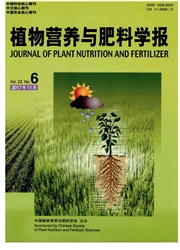

 中文摘要:
中文摘要:
在田间试验条件下,采用施用基肥和追肥的方法,结合Biolog技术,分析了不同有机肥配合施用对番茄土传病害的防治效果及对土壤微生物群落多样性的影响,并探讨了有机肥防治作物土传病害的机理及意义。结果显示,有机肥的施用对大田番茄青枯病、枯萎病、茎基腐病等3种土传病害均有显著的防治效果,粉状有机肥和液体有机肥配合施用时防病效果最显著;有机肥的施用还改善了土壤微生物群落结构。土壤微生物群落的AWCD和Shannon index与作物发病情况有较好的一致性,显示施肥提高土壤微生物多样性,对土传病害的防治有重要的影响。
 英文摘要:
英文摘要:
The experiment was carried out to study the effects of combined application of organic fertilizers on the control of soilborne diseases and the regulation of soil microbial diversity in a tomato field by using the method of Biolog. The mechanism of soilborne disease control and its significance were also discussed. The results show that the combined application of organic fertilizers could control three kinds of the soilborne diseases, such as tomato bacterial wilt ( Ralstonia solanacearum ) , Fusarium wilt( Fusarium oxysporum f . lycopersici ) , and basal stem rot wilt (Rhizoctonia solani ). The effect of combined application of the powdery organic fertilizer as base fertilizer and top-dressing liquid organic fertilizer at two times on control soilborne diseases is the best. The soil microbial community structure is improved with the application of organic manures. AWCD and Shannon index of soil microbial communities are greatly related to the incidence of the diseases. These results indicate that the organic fertilizer application could increase the soil microbial diversity, and has significant importance for controlling the soilborne diseases.
 同期刊论文项目
同期刊论文项目
 同项目期刊论文
同项目期刊论文
 期刊信息
期刊信息
